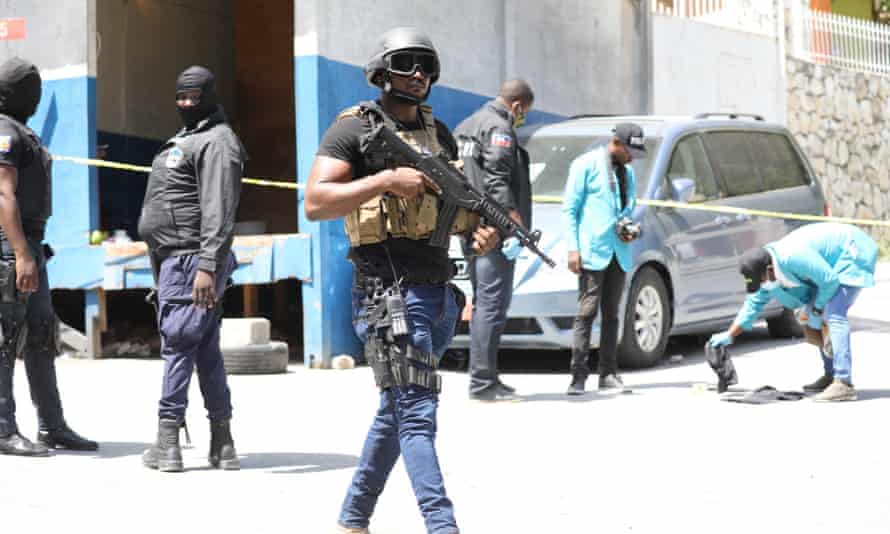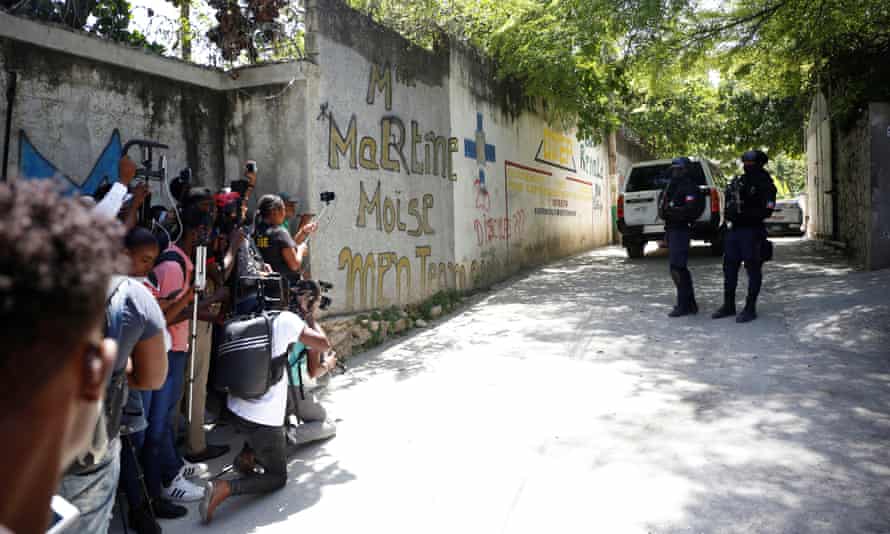Haiti’s security forces have killed four members of a group of “mercenaries” who assassinated President Jovenel Moïse in his home, police chief Leon Charles has said.
“The police is still in combat with the assailants,” Charles said in a televised briefing late on Wednesday, “We blocked them en route as they left the scene of the crime. Since then, we have been battling with them.” Two of the attackers had been detained. Of the rest he said: “They will be killed or captured”.
Haiti’s communications secretary, Frantz Exantus, had earlier said police had arrested the “presumed assassins” without providing any further details. Three police officers held hostage by the suspected gunmen were freed late Wednesday, Charles said.
The killing of Moïse earlier on Wednesday, and the wounding of his wife, was expected to bring more chaos to the unstable Caribbean country already beset by gang violence, soaring inflation and protests by opposition supporters who accused Moïse of increasing authoritarianism.
Interim prime minister Claude Joseph said the police and military were in control of security. The poorest country in the Americas, Haiti has a history of dictatorship and political upheaval.
Speaking on a local radio station, Claude Joseph confirmed that Moïse, 53, had been killed, saying the attack was carried out by an “armed commando group” that included foreigners.

In a televised national address, Joseph declared a state of emergency across the country, and made a call for calm. “The situation is under control,” he said.
In a later interview with the Associated Press, Joseph called for an international investigation into the assassination, said that elections scheduled for later this year should be held and pledged to work with Moïse’s allies and opponents alike.
“We need every single one to move the country forward,” Joseph said. He alluded to enemies of the president, describing him as “a man of courage” who had opposed “some oligarchs in the country, and we believe those things are not without consequences.”
According to the Haitian ambassador to Washington, Bocchit Edmond, Moïse’s killers claimed to be members of the US Drug Enforcement Administration (DEA) as they entered his guarded residence.
“This was a well-orchestrated commando attack,” Edmond told the Guardian. “They presented themselves as DEA agents, telling people they had come as part of a DEA operation.”
In videos circulating on social media, a man with an American accent is heard saying in English over a megaphone: “DEA operation. Everybody stand down. DEA operation. Everybody back up, stand down.”
Residents reported hearing gunshots and seeing men dressed in black running through the neighbourhood.
“It could be foreign mercenaries, because the video footage showed them speaking in Spanish,” Edmond said. “It was something carried out by professionals, by killers … But since the investigation has been just been opened, we prefer to wait on legal authorities to have a better assessment of the situation. We don’t know for sure, with real certainty, who’s behind this.
“This is an act of barbarity. It’s an attack on our democracy,” he said.
Edmond said he had asked the White House on Wednesday morning for US help in identifying and capturing the killers.
“We need a lot more information,” Joe Biden said later at the White House, calling the killing “very worrisome”.
In a written statement, the US president offered condolences and assistance. “We condemn this heinous act, and I am sending my sincere wishes for first lady Moïse’s recovery,” the statement said. “The United States offers condolences to the people of Haiti, and we stand ready to assist as we continue to work for a safe and secure Haiti.”

The UN Security Council condemned the assassination and called on all parties to “remain calm, exercise restraint and to avoid any act that could contribute to further instability.”
In a statement the 15-member council also called for the perpetrators to be brought to justice. The council is due to be briefed on the killing in a closed-door meeting on Thursday.
The attack took place at Moïse’s house in the Pelerin 5 district of Pétionville, a wealthy area with sometimes substantial and leafy villas in the hills above the capital, Port-au-Prince, with a reputation for being safe. It is an area critics of Moïse said he was loth to leave.
“Around one o’clock in the morning, during the night of Tuesday 6 to Wednesday 7 July 2021, a group of unidentified individuals, including some speaking Spanish, attacked the private residence of the president and fatally injured the head of state,” Joseph said in a statement quoted in the media.
Edmond said that Moïse’s three children were safe but his wife, Martine, was seriously wounded in the attack and was being taken to a hospital in Miami on Wednesday.
The attack happened barely 24 hours after Moïse had named a new prime minister, Ariel Henry, to take charge as head of the government and prepare the country for presidential elections in the next two months.
Moïse, a former entrepreneur, was the anointed political successor of the former president Michel Martelly. The assassination is likely to plunge the impoverished Caribbean nation into further turmoil after several years marked by political unrest and violence.
The US embassy said it would be closed on Wednesday owing to the “ongoing security situation”. “We’re still gathering information,” the White House press secretary, Jen Psaki, said on MSNBC. “We’re still assessing right now.”
“It’s a horrific crime,” Psaki added in an interview with CNN. “We stand ready and stand by them to provide any assistance that’s needed.”
Boris Johnson, the UK prime minister, said: “I am shocked and saddened at the death of President Moïse. Our condolences are with his family and the people of Haiti. This is an abhorrent act and I call for calm at this time.”
As details of the assassination emerged, the Colombian president, Iván Duque, called on the Organisation of American States to send an urgent mission to “protect the democratic order in Haiti”.
Moïse’s time in office was marked by an increase in political instability, allegations of corruption and a long-running dispute about when his period in office should end. He had been ruling by decree for more than a year after the country failed to hold legislative elections and he wanted to push through controversial constitutional changes.
There have been intermittent periods of protests and street violence and a rise in gang violence, some of it tied to political parties.
Instability has been exacerbated by the Petrocaribe scandal, a controversy that arose from a scheme to buy discounted oil from Venezuela on cheap credit. The idea was to free up funds for social schemes, but the money was pocketed by politicians.
Earlier this year amid allegations by Moïse of a coup attempt that planned to “murder him” and fresh protests, he moved to protect his position, ordering the arrest of 23 people including a supreme court judge and a senior police official, while declaring he was “not a dictator”.
Opponents had also accused Moïse’s government of fuelling political violence by providing gangs with guns and money to intimidate his adversaries.
The Caribbean country – the world’s first black republic after its revolution against French rule – has a history marked by poverty, authoritarian rule, political instability and external interference including a long US occupation. It has struggled to rebuild since a devastating earthquake in 2010 and Hurricane Matthew in 2016.


Comments